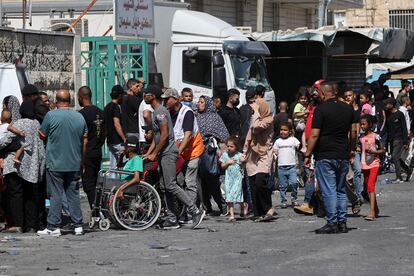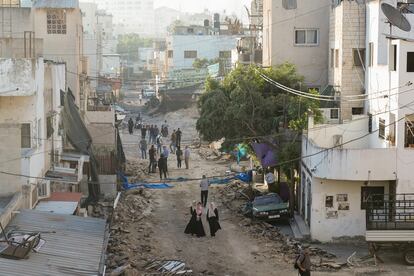Thousands of women and children flee Jenin: ‘I’m used to it, but this was far beyond the usual’
Hours after the massive evacuation of hundreds of families, the Israeli military operation has come to an end after almost 48 hours and 12 deaths

Kifaj Milhim lifts her tunic slightly to reveal the sandals her sister-in-law has lent her. She was barefoot inside her house in the Jenin refugee camp when, after 22 hours of air raids and the rumble of armored vehicles and bulldozers, Israeli soldiers announced in Arabic through loudspeakers that they had two hours to leave. “I didn’t want to risk it. I took the children and just walked out. It can’t have been more than a minute. In my hurry, I didn’t even close the front door of the house. It must still be open,” she says at the Korean Center in Jenin, where dozens of volunteers on Tuesday handed out food, drinks, diapers and medicines to the thousands of camp dwellers who, like her, left the night with just the clothes on their backs.
“They were throwing noise grenades and tear gas, but you could see that the soldiers had opened a kind of corridor for us to get out of there. They told us to walk with our hands in the air,” she explains. Milhim, 46, who has come to the Korean Center to get her diabetes medication that she left behind when she rushed out of her house, sounds between relieved and resigned to having left the camp, a space of 0.42 km² and 18,000 residents where there is no longer running water or electricity.
It is there that the largest Israeli military operation in the West Bank in almost two decades, aimed at “eradicating terrorism,” in the words of Prime Minister Benjamin Netanyahu, took place for the second day in a row. At least 12 people are dead (at least half of them militants) and more than 100 wounded, 20 of them seriously. Although a Hamas attack in Tel Aviv that left eight people wounded has highlighted the risk of the violence expanding, there were few clashes inside the camp and on Wednesday morning the Israeli army confirmed the end of the operation.
“How could I not leave?!” exclaims Mbarah Lahluh, who does not remember anything similar happening here since 2002, when the Israeli army invaded all of Jenin for 10 days, in Operation Defensive Shield, in the middle of the Second Intifada. “We have children and grandchildren to take care of, and there is no electricity or running water. We wanted to stay to protect our houses. I am from the camp, so we are used to it, but what this was far beyond the usual,” she adds. At 43 years old and with three children to care for, Lahluh says she was “very scared” when she heard a series of explosions in “a house full of children.” She describes how “every time they heard an explosion, they would start screaming.”

According to the Red Crescent, some 3,000 people have fled the camp since Monday night. Some of their own free will, others, urged by the soldiers. The deputy governor of Jenin, Kamal Abu Arub, estimates that 1,000 evacuees have been taken to buildings managed by the Palestinian Authority. The rest are staying with relatives or residents elsewhere in the city, explains Ali Abu Yab, the volunteer who coordinates the Korean Center. “We have received twice as many offers to house people from the countryside than people asking for it. Last night, as they were arriving, many did not even enter the center, because they were picked up directly by people who were waiting for them at the entrance with their cars parked. Most of them were not their relatives,” he explains.
Abu Jab figures that between 500 and 600 families showed up during the day to get supplies. On the floor there are diapers, bottles of water, bags of pita bread, and boxes of cucumbers and tomatoes. Two trucks arrive from the nearby town of Tubas with more water, as well as milk and sweet potatoes. They have been donated by their inhabitants, in a collection that took place the night before on social media.
In the background, a constant hum of drones flying overhead can be heard. Sporadically, there are sounds of explosions and shots. Even outside the camp, the atmosphere is one of war. Israeli forces fire tear gas at the entrance to the hospital, where ambulances and relatives are waiting, and some young people are dozing, forcing everyone to run inside the building.
Military vehicles are not only inside the camp, which they keep surrounded and where access is prohibited. They are also in the rest of the city of Jenin, which is looking like a ghost town. The few civilian vehicles on the roads are avoiding the barricades and the remains of tires set on fire the night before by local youths. There is one group of young men throwing tar on a street to try to stop the armored vehicles. while another group throw stones at the latter. One of them carries in his hand a homemade explosive made from a fire extinguisher.
The Israeli army reported on Tuesday that more than 300 Palestinians have been interrogated and 30 of them arrested in the operation. Among the first is a brother of Sabrín Mustafa Abu Yilde, a 19-year-old woman. “About 20 soldiers broke down the door of our house. They took down the photos we have of [another] brother, who became a martyr [died in the conflict] last year, threw them on the ground and stomped on them. Then they locked us women and children in a room until they left,” she says.
The Israeli military spokesman, Daniel Hagari, who on the first day of the operation said it would last between 24 and 48 more hours, assured on Tuesday that “there is not a single corner of the refugee camp” that the army has not reached, and that they only have 10 “goals” left. He has estimated at 300 the armed men who remain in place and admitted that the majority are avoiding direct confrontations, aware of the asymmetry of forces.
Elsewhere in the West Bank, particularly on the approaches to the city, military checkpoints have multiplied, with soldiers at numerous crossings where they are not usually posted. Almost all of the territory, which Israel has occupied since its victory in the 1967 Six-Day War, has gone on strike in solidarity with Jenin. Only pharmacies and some food stores seem to be open.
In Huwara, a town famous because Israeli Finance Minister Bezalel Smotrich once encouraged “wiping it off the map,” a car mechanic is protesting the opposite way. Two soldiers guarding the road directly opposite demand that he shut down, while he insists on staying open. They approach and force him to abide by the order. “Some children threw stones at us”, says one of them. “I don’t know who they were, do you? Well, until I find out, all of Huwara is going to suffer.”
Sign up for our weekly newsletter to get more English-language news coverage from EL PAÍS USA Edition
Tu suscripción se está usando en otro dispositivo
¿Quieres añadir otro usuario a tu suscripción?
Si continúas leyendo en este dispositivo, no se podrá leer en el otro.
FlechaTu suscripción se está usando en otro dispositivo y solo puedes acceder a EL PAÍS desde un dispositivo a la vez.
Si quieres compartir tu cuenta, cambia tu suscripción a la modalidad Premium, así podrás añadir otro usuario. Cada uno accederá con su propia cuenta de email, lo que os permitirá personalizar vuestra experiencia en EL PAÍS.
¿Tienes una suscripción de empresa? Accede aquí para contratar más cuentas.
En el caso de no saber quién está usando tu cuenta, te recomendamos cambiar tu contraseña aquí.
Si decides continuar compartiendo tu cuenta, este mensaje se mostrará en tu dispositivo y en el de la otra persona que está usando tu cuenta de forma indefinida, afectando a tu experiencia de lectura. Puedes consultar aquí los términos y condiciones de la suscripción digital.









































